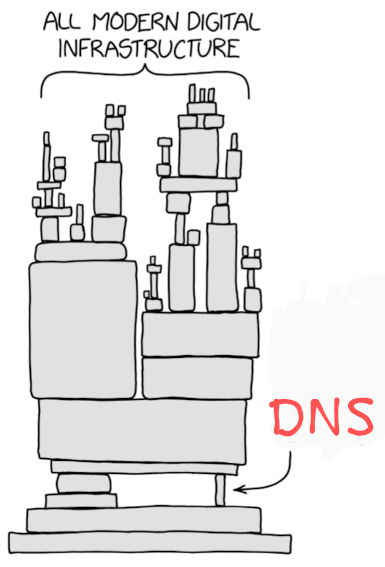Ah yes, the evil government system that gets in the way of good people trying to run digital Ponzi schemes.
NaibofTabr
- 2 Posts
- 935 Comments
Sort of… but saying that the government can issue as much new currency as they want is disingenuous and this is addressed later in the video, but it literally says that the tax money is “destroyed”… this is not really correct.
The value of a government currency like the dollar comes ultimately from confidence in the US economy. If the economy produces value, then the dollar represents a piece of that value. If the economy is unproductive (less value is produced) then tax revenue is lower, and less new money can be issued.
So to close the circle, your taxes do pay for something… the government’s capacity to issue new money, which it then uses to pay for government services &etc. Saying that “your taxes pay for nothing” is kind of a pointless argument over semantics, because without the tax collection the government would not be able to pay for anything.
Well duh. Kind of missing the point though.
What if I hire a dozen people to randomly, individually go and pick all the fruit and bring it to me, and then I make a profit reselling what they collect?

 13·2 days ago
13·2 days agoFloating solar farms make use of water surfaces that would otherwise go unused. Plus, by shading the water below, floating solar arrays help reduce evaporation – an added bonus in arid regions like this one.
The dual benefit makes this seem like a no-brainer, but I suspect there are some careful considerations needed before floating a high-voltage system on a lake… I wonder how much risk there is from wind.

 41·3 days ago
41·3 days agoYou could always try Red Star OS

 132·4 days ago
132·4 days agoI bet GeForce didn’t do the data collection they want, and it was too much trouble to try and shoehorn it in, so they built a new app. I bet there’s user data collection in there related to their AI business.

 111·4 days ago
111·4 days agoNever ascribe to malice what can be explained by incompetence.

 91·4 days ago
91·4 days agoYou say that with such confidence, but the counter disagrees.
We all live in denial of something…

Please refer to this helpful diagram:


 28·6 days ago
28·6 days agoRupert Murdoch is to blame for a lot of it.

 4·6 days ago
4·6 days agoThe biggest question is, do you think your tax percentage will be higher now, or higher in the future? If you think your income might increase later (placing you in a higher tax bracket), or that the government might increase your tax burden later, then it’s better to pay taxes now.

 22·7 days ago
22·7 days ago(D), in case anyone was in doubt. Also:
The Car Privacy Rights Act is cosponsored by Senator Elizabeth Warren (D-MA)

 602·7 days ago
602·7 days agoI mean… what is your threat profile? Are you a LastPass engineer with an unpatched Plex install and access to the company file server? (edit: LastPass not LinkedIn)
Are you going to do something that would attract the attention of law enforcement or nation-state threat actors?
Are you going to be using this mini PC to do your taxes?
Is it going to be in a DMZ with open access to the Internet?
Are you going to use it as an authentication server for other critical assets?
If you aren’t assessing your risk level with some realistic idea of what threats actually apply to you and weighing that against the possible consequences of a breach, then you’re pointlessly worrying about low-probability scenarios. Operational Risk Management right? Judge your risk by probability of occurrence and severity of impact and then make decisions based on that.

 9·8 days ago
9·8 days agoAs one of the Mastodon users pointed out, it’s very likely that those cells are still producing some current when exposed to light. The electrical contacts would be a hazard.
I would also expect this thing to get pretty hot in sunlight - after all it’s designed to absorb energy.

 51·8 days ago
51·8 days agoI agree that redundancy is a good way to mitigate risk, but there are so many problems between us and successfully colonizing another world that this is basically a pipe dream.
Astronauts experience a lot of health issues.
After less than a month in space, the tubules that fine-tune calcium and salt balance showed signs of shrinkage, which the researchers say was likely due to microgravity rather than GCR.
The study suggests that optic disc edema and choroidal folding contribute to spaceflight-associated neuro-ocular syndrome, whose symptoms include headaches and visual impairment such as far-sightedness (hyperopia), which causes near objects to appear blurred due to lower visual acuity at short range.
The scientists said the heart tissues “really don’t fare well in space,” and over time, the tissues aboard the space station beat about half as strong as tissues from the same source kept on Earth. […] Previous studies showed that some astronauts return to Earth from outer space with age-related conditions, including reduced heart muscle function and arrhythmias (irregular heartbeats), and that some, but not all, effects dissipate over time after their return.
And of course there’s all the problems caused by radiation exposure once you’re outside the Earth’s magnetic field (Mars doesn’t have a global magnetic field). Basically, we can put ourselves in a tin can and venture into space, but the human body evolved in Earth’s gravity and radiation profile and it doesn’t do well outside of that. At the present you’d have to be suicidal to try to live long-term away from Earth, and I don’t think these are problems that we can just engineer our way out of.

 7·8 days ago
7·8 days agoThis is a constraint designed into bitcoin to produce artificial scarcity so that the volume of tokens doesn’t massively inflate and destroy their value. A blockchain doesn’t have to operate this way if the goal is to produce unique tokens as identifiers rather than as currency.

 20·8 days ago
20·8 days ago







Removed by mod